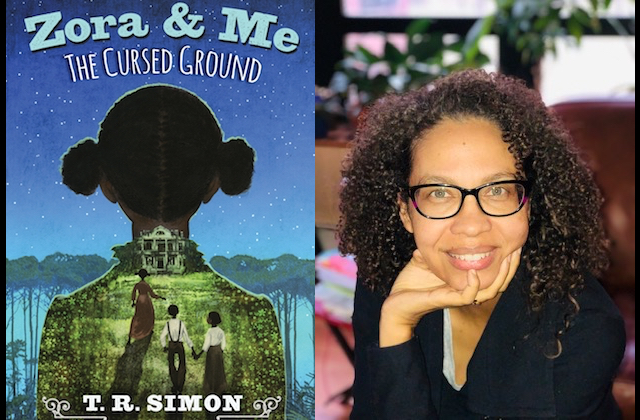"Zora and Me: Cursed Ground," the second volume in the Zora and Me series, is a fictional mystery about the childhood adventures of writer Zora Neale Huston as seen through the eyes of her best friend, Carrie Brown. The story delves into the legacy of slavery, and shows how that painful time connects directly to Jim Crow and The Movement for Black Lives. We spoke to author T.R. Simon* about what her book can teach Black children about themselves, and why it’s so urgent for them to know the truth about their history and the power that lives inside them.
Your book reads like a beautiful love letter to Zora Neale Hurston. At the same time, it’s painfully honest with its young audience about the horrors and lasting traumas of slavery. Why did you choose to be so brutally honest with young readers?
I have this whole philosophy I call "hard history." I believe that young people do not benefit from being lied to, or from having the truth defanged in the way that a kind of White middle-class idea of childhood values innocence over knowledge and truth. And whenever they say innocence, I perceive this as just another way of saying we’re going to preserve the status quo no matter what. This line of thinking leads to false equivalencies like White and Black folks were trapped in slavery together. I’m like, "No, we were not trapped together. We were enslaved and you were raping and beating us and selling us away from each other." I don’t deny the truth. I hold the truth with love. I wanted to tell my daughter the story of slavery in a way in which a Black girl wasn’t broken by it, but could also get her mind around it—without having to pretend that it was something that it wasn’t.
As we all do our best to navigate this divisive and scary political climate, what lessons can our children take from your story and apply to their own lives?
Narratives that Whitewash slavery are doing so to mask complicity; so we must be wary of these narratives. When my daughter was 11 years old last year, her class read the book "Chains." And the group had a conversation about who was kinder, the mistress or the master? My daughter listened for a couple of minutes as students debated over who was cruel and who was kind. She then raised her hand and said, "I don’t get this conversation. How can we talk about someone being kind when they owned slaves?" And then the teacher shut the conversation down. I told my daughter that was the mask. That’s when you’re supposed to say to them, "I forgive you and it’s okay." And they don’t have to feel culpable. And if they don’t feel culpable, they don’t have to make reparations. And by reparations, I mean identify and act against their White supremacist privilege. These are the kinds of things we talk about.
What inspired you to tell this story?
I wanted to provide an origin story for the tremendous amount of intellectual curiosity that is the heart of Zora Neale Hurston. The woman was interested in everything. I also want that to be the legacy we give our children. I want them to know there is nowhere your mind can’t go. Nothing is intellectually off limits to your beautiful, Black mind. I think we’re entering a really hateful time, and I don’t want these these folks who oppose Black equality and humanity feeling like they can prey on our children. We’ve said it for centuries, but there’s nothing more terrifying than a brilliant Negro. That is the scariest thing to these people in this culture. They can’t stand brilliant Black people. They want to destroy them.
This book centers Black girl friendships and the ways these can be the most sustaining and fulfilling relationships of our lives. Why is this a crucial message for the YA audience?
When it comes to Black girl friendships—and this I took straight from [Hurston’s] "Their Eyes Were Watching God"—if you have a Black girlfriend who is your best friend, who is your secret keeper, you can survive almost anything. When Janie comes home, she comes home to the women. It’s the women on the porch. And without that, you’re so unmoored as a Black woman. I want my daughter to have a model of that. I also think girls with best friends are more protected from bullying than girls who are not. I think we talk a lot about mean girls, and we don’t talk enough about how we need to teach our girls how to make deep, healthy friendships because that will protect them.
Editors note: The literary agency that T.R. Simon co-owns represents senior editorial director Akiba Solomon and deputy editor Kenrya Rankin.
